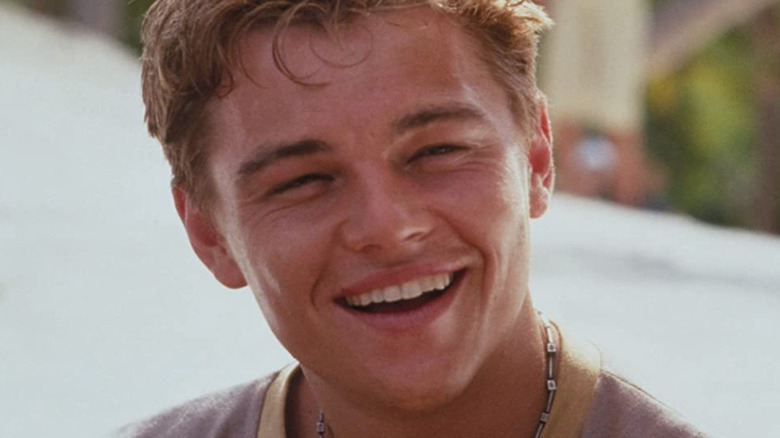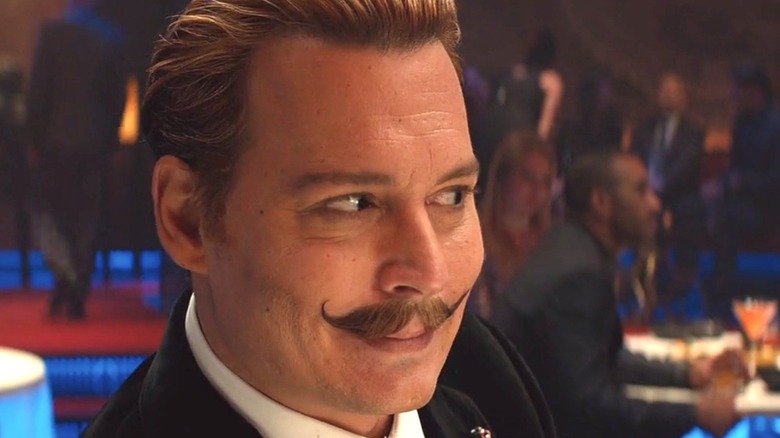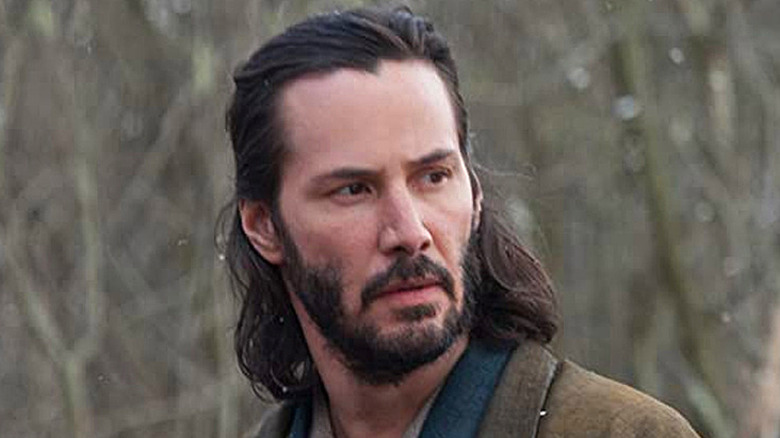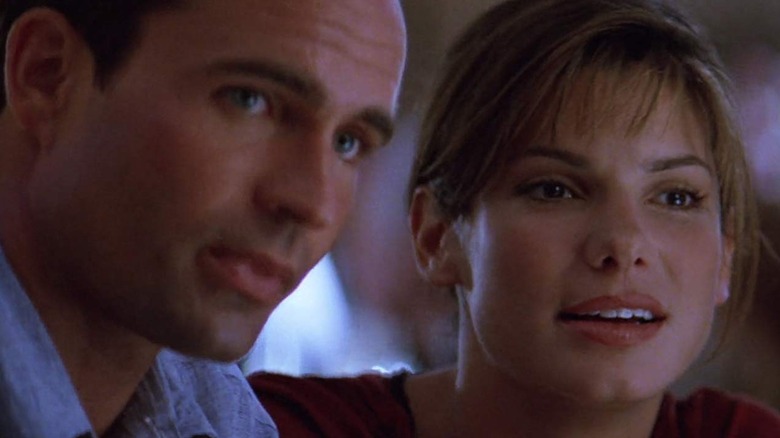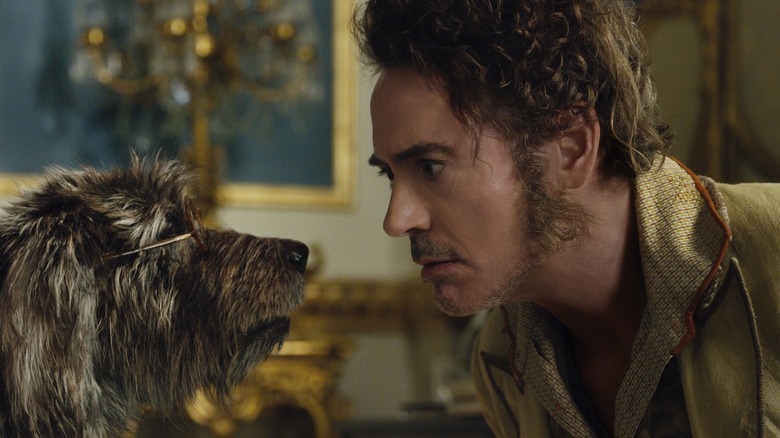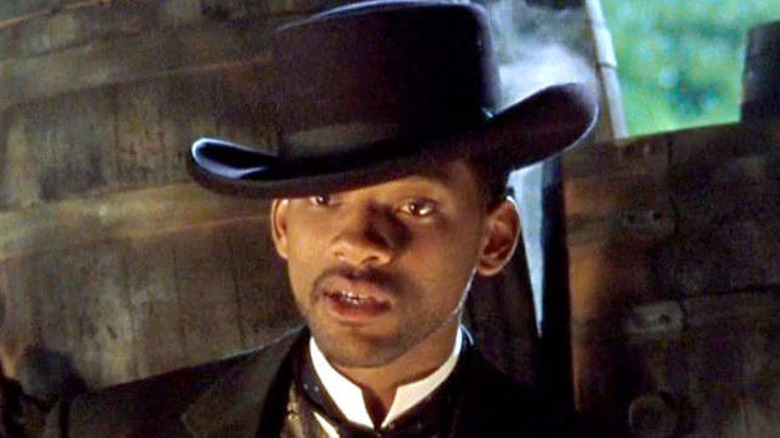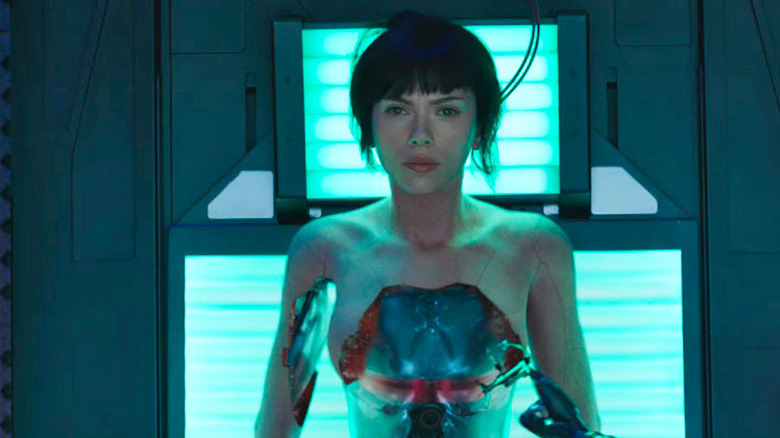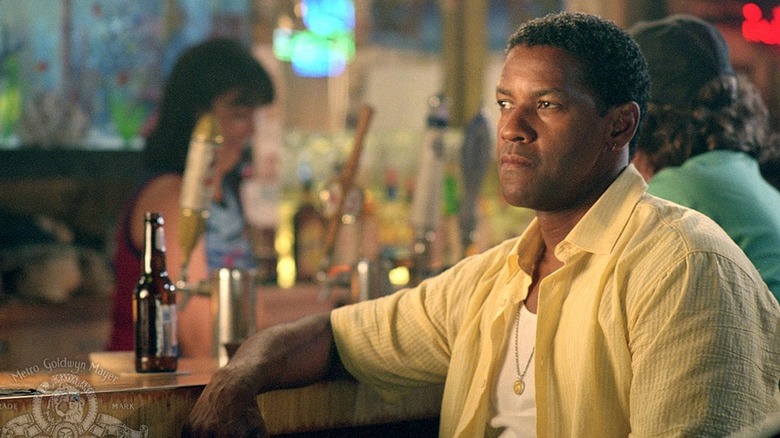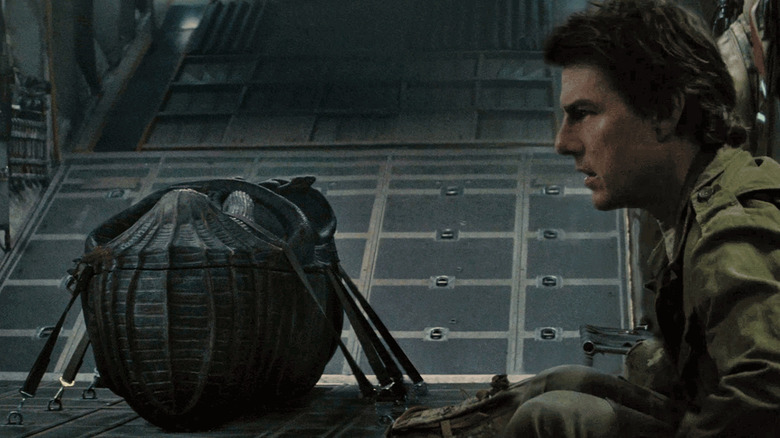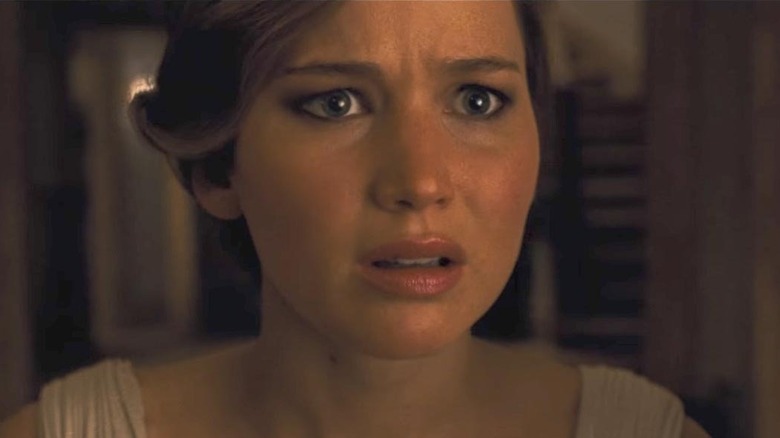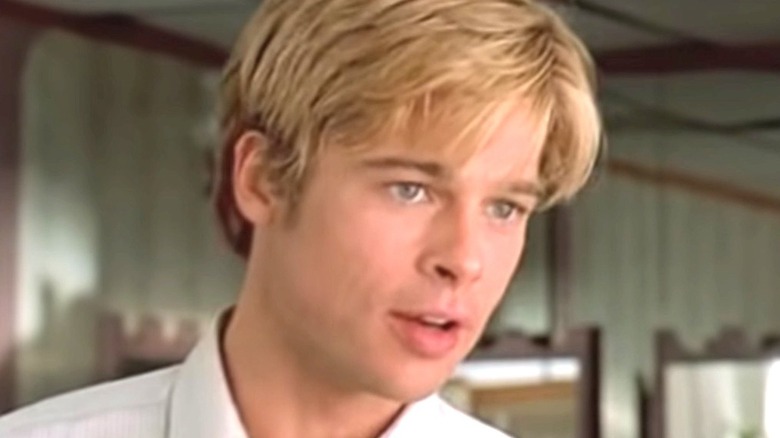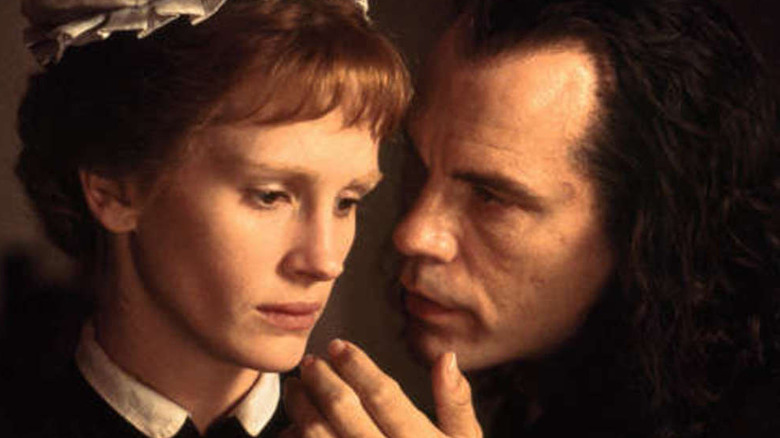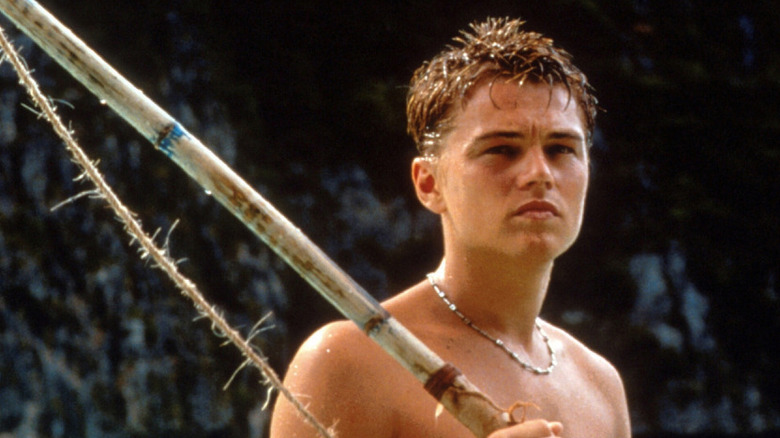Famous Movie Stars' Biggest Box Office Bombs
What makes a movie star? As Katharine Hepburn once said: "It's either some kind of electricity or some kind of energy. I don't know what it is, but whatever it is, I've got it." Studio executives would be less poetic: "A movie star makes money." If a studio invests $10-$20 million on a star's salary, they expect a return. If the actor consistently delivers, they're a movie star. If not? They'll have to pay the bills in supporting parts. But there's a difference between being consistently bankable, and batting a perfect .500 at the box office. Much like a star quarterback can have a bad game, even the most reliable movie stars have major bombs.
Many times these bombs are admirable creative risks that just didn't pan out. Others seem like surefire hits on paper, but underperformed due to overblown budgets or just being bad. Still others reek of "What were they thinking?" and probably resulted in the actor's agent or manager getting fired. We won't include any bombs from before the actor was famous (because they weren't stars yet, duh), nor will we include low-budget indie films that only lost a few million. Nope, these are bombs with a capital "B." We'll also use the rule-of-thumb that a movie must make twice its budget to make money (which these movies most certainly did not). What are they? Here are famous movie stars' biggest box office bombs!
Johnny Depp: Mortdecai (2015)
Johnny Depp boasts career box office earnings of $4 billion domestically and $10.8 billion worldwide. No surprise, the biggest contributor to his total are the five "Pirates of the Caribbean" films, which have made $1.45 billion domestically and $4.5 billion worldwide. However, that still leaves about $6.3 billion in global earnings from films in which Depp didn't play Captain Jack. Point being? Dude is still a star in his own right. But even a movie star of Depp's magnitude couldn't save "Mortdecai."
If you've forgotten what it's about (or more likely, never saw it), Depp plays a shady art dealer who is hired to find a stolen painting rumored to contain the code to a bank account filled with Nazi gold. It sounds ... great. It wasn't. Only 12% of critics and 30% of audiences could stand it, and almost nobody paid to go see it, as it earned a scant $7 million domestically and $30 million worldwide, losing about $90 million on a $60 million budget. We know what you're thinking: Wait, wasn't "The Lone Ranger" a bigger bomb? Technically, yes, it's $260 million worldwide was about a $190 million loss for Disney. However, while Depp received top billing in "The Lone Ranger," the "brand" and visual effects were also the draws (or not). The financial failure of "Mortdecai" was mostly on Depp.
Keanu Reeves: 47 Ronin (2013)
Keanu Reeves has been the "Internet's Boyfriend" since before the Internet. He first rose to fame in 1989's "Bill and Ted's Excellent Adventure," became a movie star with 1994's "Speed," starred in the iconic "The Matrix" in 1999, then kinda fell off the radar until 2014's "John Wick." Now in the midst of a Reeves-naissance, Keanu proves that even in Hollywood, nice guys can finish first ... provided they do so by shooting a lot of people. In between "The Matrix Revolutions" in 2003 and "John Wick" 11 years later, Reeves was on a bit of a dry spell as an above-the-title draw, including starring in the biggest bomb of his career, "47 Ronin."
An expensive ($175 million) fantasy epic featuring an international cast, "47 Ronin" probably sounded like a good idea on paper. And indeed the plot does sound interesting: Reeves plays a mixed-blood ronin in feudal Japan who is recruited by an old foe to help take on a wicked nobleman. Alas, the movie was dull and one-dimensional (as evidenced by its 16% Tomatometer score) and never found an audience either domestically ($32 million) or worldwide ($151 million), losing an estimated $199 million. Thankfully, Reeves followed this up with "John Wick" about one year later. Reeves' 64 films have earned $2.5 billion domestically and $5.8 billion worldwide, but very little of that came from "47 Ronin."
Sandra Bullock: Speed 2: Cruise Control (1997)
It's usually not a good idea to make a sequel without original cast members. However, when your sequel stars Sandra Bullock, you could be forgiven for thinking it might work. Bullock has been an above-the-title box office draw since 1995's "While You Were Sleeping" banked $182 million worldwide, but before that was a reliable "value-add" in action movies starring Sylvester Stallone ("Demolition Man") and Keanu Reeves ("Speed"). The latter made $283 million worldwide in 1994 on a $30 million budget. With numbers like that, movie studios asked themselves: "Pop Quiz Hotshot: What do you do?" Sequels, obviously. However, what you don't do is spend $110 million on the franchise follow-up, "Speed 2: Cruise Control," without the original film's star (Keanu Reeves).
Bullock was back, this time on a cruise liner playing the damsel-in-distress to Jason Patric, akin to making "Terminator 2: Judgment Day" with just Linda Hamilton and not Arnold. "Speed 2" was sunk from the start, and its 4% critics score and 16% audience score only added to the catastrophe. "Speed 2" set sail with a $16 million opening, but fell to the bottom of the ocean, earning $48 million domestically and $150 million worldwide, losing about $70 million. Even with Sandra Bullock (with $2.7 billion domestic and $5.6 billion worldwide in career earnings), "Speed 2" proved (again) why it's a bad idea to make a sequel without the original star.
Robert Downey Jr.: Dolittle (2020)
Robert Downey Jr.'s jump to movie stardom may be the most dramatic on this list. It has certainly taken the longest. How did Downey Jr. go from "box office poison" to career earnings of $6.2 billion domestically and $15.7 billion worldwide? Two words: Iron Man. That's not a knock on Downey, as we can confidently say no other actor would have done as well in the titanium alloy armor, not even the mega-star originally interested in playing Tony Stark, Tom Cruise. However, Downey Jr. hasn't made billions exclusively as Iron Man, as "Tropic Thunder," "Due Date," and the "Sherlock Holmes" films prove he is a star in his own right.
That said, his biggest career misfire came right after he finally hung up the suit, which is saying something, considering he never headlined a hit until 2008's "Iron Man." That film? "Dolittle." In fairness, the film's failure was largely a matter of scale, as $77 million domestically and $251 million worldwide isn't that bad for a live-action family movie (especially one that was really bad). The problem was the $175 million budget, basically the cost of a Marvel movie, meaning "Dolittle" lost about $99 million. What was Universal thinking? Probably that Downey Jr. could do no wrong. But expecting "Dolittle" to earn more than $350 million was a bad idea, and even an animal could tell you that.
Will Smith: Wild Wild West (1999)
Will Smith's cinematic nine-hit run from "Men In Black II" in 2002 to "Men In Black III" in 2012 is pretty much unprecedented, and doesn't even include some of his most iconic films, like 1995's "Bad Boys," 1996's "Independence Day" and 1997's "Men In Black." With total grosses of $3.9 billion domestically and $9.5 billion worldwide across 33 films, Smith has averaged $194 million domestically and $308 million worldwide. However, that doesn't mean he hasn't starred in some huge duds, such as 2013's "After Earth" and 2019's "Gemini Man." While those films are close to being Smith's biggest bombs, when it comes to The Fresh Prince's biggest flop only one film can wear the crown (or maybe we should say cowboy hat?): "Wild Wild West."
Warner Brothers probably figured Smith's sui generis charisma could power a risky bet — a sci-fi western based on a cult TV show — to profitability, and wrote a check for $175 million (about $286 million today). "Wild Wild West" only earned $113 million domestically and $221 million worldwide, so we estimate it lost around $129 million. Getting knocked off his throne ("...as the prince of Bel-Air") was bad enough, but what really stung is the movie Smith turned down to do "Wild Wild West" – "The Matrix."
Scarlett Johansson: Ghost In The Shell (2017)
Scarlett Johansson rose to fame as a 19-year old ingenue in 2003's "Lost In Translation," but later established herself as a bankable action movie star, especially as Natasha Romanoff, a.k.a. Black Widow. With $5.5 billion domestically and $14.9 billion worldwide over 49 films, we'd say casting ScarJo is usually a sure thing ... provided you're not casting her as a Japanese cyborg in a $110 million cyberpunk sci-fi film based on a well-regarded, but let's be honest, pretty obscure anime, "Ghost In The Shell."
The original 1995 film is considered a masterpiece of its genre, with the 96% Tomatometer score to prove it. That genre is anime; it is not multi-million dollar blockbuster. Surprising pretty much nobody except Paramount Pictures, "Ghost In The Shell" got lost in translation (see what we did there?), resulting in a 43% Tomatometer score, a far cry from the original. Moviegoers ghosted "Ghost In The Shell," which earned $40 million domestically and $167 million worldwide. Based on its budget, we estimate "Ghost In The Shell" lost about $53 million. Not the end of the world, but definitely not a performance Johansson wants to repeat.
Denzel Washington: Out of Time (2003)
Denzel Washington is one of those rare movie stars who could be in a movie titled "Denzel Washington's Next Movie" and it would probably make money. And by "rare," we mean there's only a few actors who can pull that off. Washington is one of them. Granted, he has never had a multi-billion grossing franchise entry (his highest-grossing film is "American Gangster" with $267 million worldwide), but he's never needed one either. His career earnings of $2.5 billion domestically and $4.28 billion worldwide across 51 films has been almost exclusively because of him. Not "Denzel Washington as (Insert Character Here)." Just Denzel.
One Denzel Washington movie that didn't earn a lot of George Washingtons, however, was 2003's "Out of Time." Washington plays Matt Lee Whitlock, a small town Florida chief who steals a ton of money to pay for his lover's cancer treatment. When she winds up murdered, Whitlock winds up the number one suspect. So yeah, the perfect setup for a solid Washington suspense thriller, which the critic's 64% Tomatometer score confirmed. However, moviegoers had no time for "Out of Time," which managed a meager $41 million domestically and $55 million worldwide. With a $50 million budget, we estimate "Out of Time" lost about $45 million.
Tom Cruise: The Mummy (2017)
Tom Cruise has been a movie star longer than most millennials have even been alive. Ever since he slid pantless down the hallway in 1983's "Risky Business," Cruise has been a perennial part of popular culture. While he currently prefers his current comfort zone of playing Ethan Hunt in the "Mission: Impossible" franchise, Cruise has proven to be incredibly bankable across multiple different genres and decades. Even movies you could have sworn were bombs (like 2013's "Oblivion" or 2017's "American Made") still, technically, made money. Credit Cruise's consistent popularity overseas, and his insane work ethic to promote his movies.
However, not even Cruise's megawatt grin could save "The Mummy." The whole concept was misbegotten from the start, as "The Mummy" was supposed to be Universal's answer to the Marvel Cinematic Universe and launch an interconnected "Dark Universe," combining their legacy horror characters like Dracula and The Invisible Man. "The Mummy" put those hopes to bed. In fairness, "The Mummy" actually made a little money, $80 million domestically and $409 million worldwide (remember what we said about Cruise's overseas bankability?), a profit of about $19 million on a $195 million budget. However, the response was so bad it tanked a would-be franchise and forced Universal to rethink their legacy characters. Alas, making a franchise out of "The Mummy" proved to be the real mission impossible.
Jennifer Lawrence: Mother! (2017)
Jennifer Lawrence is one of only a few actors on this list younger than 50 and the only one younger than 35, which just goes to show how special her talent is. That, and how terrible Hollywood has been at creating movie stars outside of franchise films. Yes, Lawrence has starred in her own franchise. Two, in fact: "The Hunger Games" and "X-Men." However, she has consistently proven to be a draw on her own, as shown by her $2.6 billion domestically and $6 billion worldwide total box office gross across 24 films.
However, not even J-Law's magic touch could save "Mother!" It's difficult to describe what "Mother!" is about, though Dahlia Balcazar's criticism does a pretty good job describing why it didn't work for mainstream audiences: "'Mother!' is what happens when a dude has an idea he thinks is brilliant and no one checks him on it." That dude was writer/director Darren Aronofsky, and his then-girlfriend Jennifer Lawrence was along for the ride. While "Mother!" wasn't meant to be a blockbuster by any means, it makes this list (and "tops" J-Law's list of biggest bombs) because of how badly it failed to deliver on its creative and commercial ambitions. With a $30 million budget, we estimate "Mother!" lost about $18 million on its $17 million domestic and $42 million worldwide gross.
Brad Pitt: Meet Joe Black (1998)
Say you're a super-handsome movie star looking to buck expectations. What's the 1995 Sexiest Man Alive to do? Play Death, of course. In 1998, Brad Pitt played the titular Joe Black, a.k.a. Death, who comes to guide a businessman played by Anthony Hopkins to the great beyond. However, Joe Black agrees to grant the businessman a few more days in exchange for getting to stay on Earth. Things get complicated, however, when Black falls in love with the businessman's daughter. It's just the sort of unexpected role Pitt has built a respectable movie career playing, and which works for him most of the time (proven by his $3.2 billion domestic and $8.3 billion worldwide career earnings).
"Meet Joe Black" was the exception to the rule. The movie's biggest problem was that its three-hour runtime was just ... too ... long. Critics snoozed through it, giving it a 45% Tomatometer score, though surprisingly moviegoers seemed to like it, with an 81% score. What they didn't do was buy tickets to go see it. With a bafflingly high $85 million budget, "Meet Joe Black" only managed $44 million domestically (international numbers aren't available), losing about $126 million. Pitt didn't have another release for almost a year, until "Fight Club" in 1999. You're not supposed to talk about "Fight Club," but we bet Pitt would rather nobody ever mentioned "Meet Joe Black" again.
Julia Roberts: Mary Reilly (1996)
In the early 1990s, Julia Roberts had established herself as "America's Sweetheart...even in suspense thrillers" with "Pretty Woman," "Sleeping with the Enemy," "Hook," and "The Pelican Brief." Then she made one of the more peculiar entries in her oeuvre, 1996's "Mary Reilly." Moviegoers probably should have sensed something was the matter when she appeared on the poster and didn't smile. "Mary Reilly" is essentially an adaptation of Robert Louis Stevenson's "The Strange Case of Dr. Jekyll and Mr. Hyde," but told from the perspective of his household maid, Mary Reilly. It's an interesting premise; alas, that's about all it is.
Critics shellacked it with a 26% Tomatometer score and moviegoers weren't much kinder, giving it a 41% score. However, things really got bloody at the box office. Even with one of the world's biggest movie stars in the title role, "Mary Reilly" mustered a macabre $5.7 million domestically and $12.9 million worldwide. As bad as that is, wait 'til you hear the budget; $47 million. Ouch. With numbers like that, we imagine "Mary Reilly" lost about $82 million. But with career box office earnings of $2.9 billion domestically and $6.3 billion worldwide, we doubt Julia Roberts is sweating the massive misfire that was "Mary Reilly."
Leonardo DiCaprio: The Beach (2000)
In 2019, Leonardo DiCaprio was called "the last movie star" by no less than the august Tinseltown institution The Hollywood Reporter. It's hard to disagree. Across 33 films, DiCaprio has earned $2.7 billion domestically and $7.19 billion worldwide, for an average of $93 million domestic and $248 million worldwide. Most impressively? He has done it with zero sequels, spin-offs, or reboots, which has pretty much been Hollywood's bread-and-butter for two decades. But as big a star as he is now, not even he's as big a star as he was in late 1997 following the release of "Titanic."
Ironic then that he followed up his biggest hit by far (or pretty much anyone's) with two of his biggest duds, 1998's "The Man In The Iron Mask" and 2000's "The Beach." Which movie wins, er, loses? Well, "The Man In The Iron Mask" made $56 million on a $35 million budget, losing about $14 million. Meanwhile, "The Beach" was almost the opposite, making $39 million on a $50 million budget, losing about $61 million. So yeah, "The Beach" loses. And then Leonardo DiCaprio was never seen or heard from again. Yeah, right: he actually starred in Martin Scorsese's "Gangs of New York" in 2002, launching one of the most critically acclaimed and commercially successful collaborations in cinema history.
